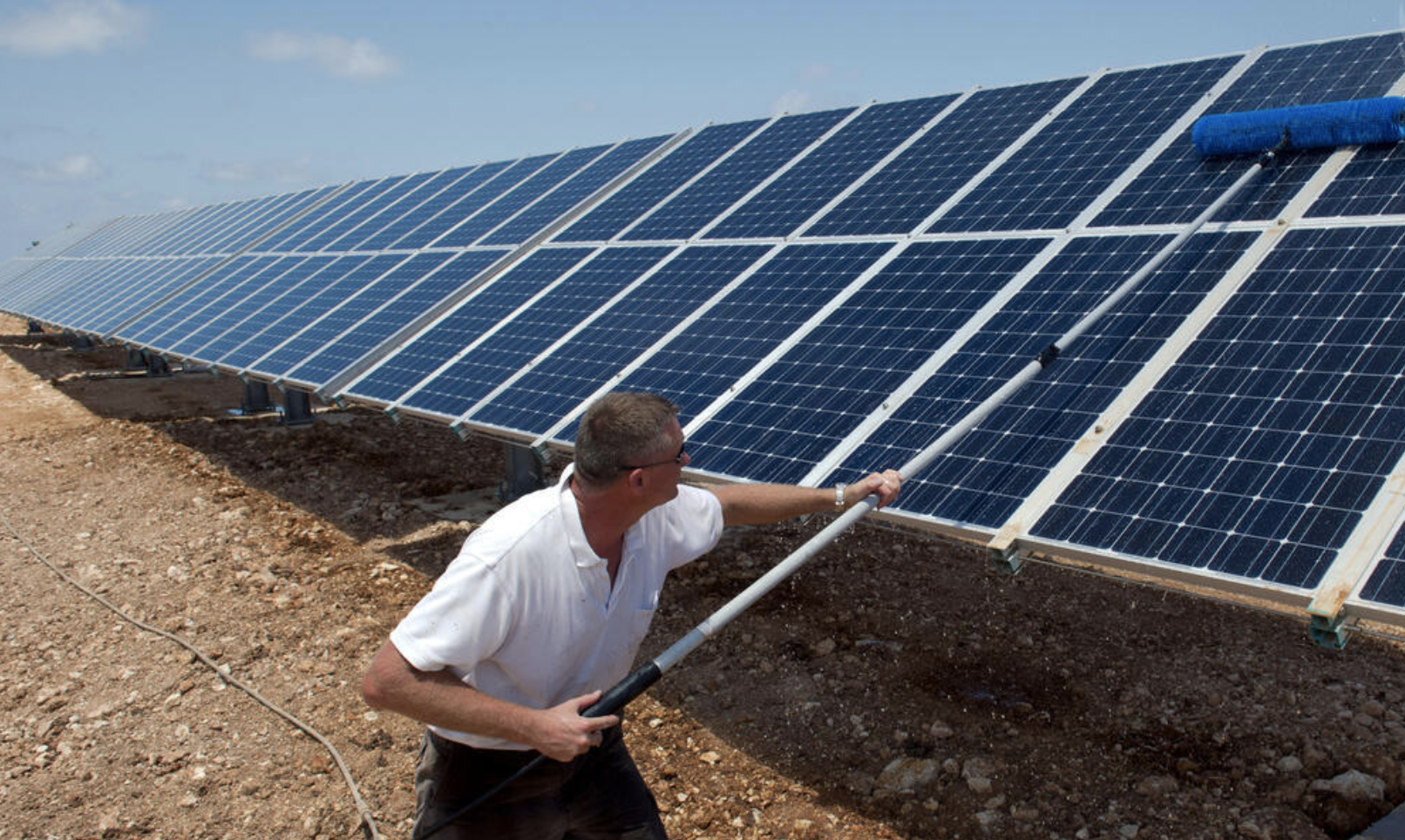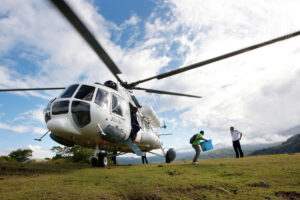Introduction
Throughout 2021, Powering Peace – a joint initiative of the Stimson Center and Energy Peace Partners – pursued opportunities to highlight our work and to draw attention to the ways in which a shift to renewable energy could benefit UN peace operations and the communities they serve. With our partners, our team has organized report launch events, side-events at high profile security conferences, and published reports that identify opportunities for renewable energy innovation in the field and make the case for sustained attention on this issue at UN Headquarters. Simply put, 2021 was a banner year for the team. So, when we received an invite to prepare a background paper for and to speak at the 2021 Challenges Annual Forum (CAF21), it felt like the perfect way to wrap up a year defined by increased political momentum and encouraging shifts in approach from key stakeholders.
The Forum is a strategic and dynamic platform for constructive dialogue among leading policymakers, practitioners and academics on key issues and developments in peace operations. Co-organized by the Challenges Forum International Secretariat (CFIS) and the German Center for International Peace Operations (ZIF), this year’s theme was “Climate and environmental security in peace operations.” This theme offered Powering Peace an ideal opportunity to share our work, which focuses on promoting greater renewable energy development in fragile states by encouraging policies and practices that accelerate the energy transitions of UN peace operations. As authors of a background paper prepared in advance of the Forum, our charge was to provide the analytical foundation for a working group conversation focused on innovative partnerships that could be implemented in the field. In our paper, we sought to distill some of the important findings and recommendations that have emerged from our case studies looking at South Sudan, DRC, and Mali, as well as our report, Shifting Power: Transitioning to Renewable Energy in UN Peace Operations, which examined the UN’s vision, policy, and practice on renewable energy so far.
Igniting a Working Group Discussion on Innovative Partnerships
While the conference had to shift to a virtual setting due to COVID concerns, the presentations and working group discussions were rich, solution oriented, and backed up by hard-won lessons learned from the field. Building on the background paper, I spoke as my working group’s “ignite speaker,” in which I was tasked with both laying out the key analysis of the background paper and offering a few guiding questions. I began my presentation by calling attention to three key research findings from Shifting Power:
- Energy issues within UN peace operations remain largely hidden despite energy’s critical role as an enabler. Thus, effective system transformation requires enhanced visibility of the role of energy in peace operations among a broader set of stakeholders. While this is beginning to change, there is more work to be done to highlight the lessons learned around energy in peacekeeping contexts.
- Accelerating a shift toward renewable energy requires understanding and navigating the dynamics — at the Secretariat, mission and Member State levels — that sustain a reliance on diesel-powered generators. Some of these dynamics include: short-term financing and mandate cycles that impede longer-term budgeting, the high upfront capital costs of renewable energy, and challenges in engaging the private sector and accessing new technologies.
- Transforming mission energy use is ripe for partnerships across the UN, the private sector, and civil society. There are opportunities for partnerships for the UN to adopt new technologies and financing models; to deepen research on the links between energy, conflict, and peacebuilding; and to identify opportunities for renewable energy to support communities and host countries in meeting their development and climate goals.
Existing Renewable Energy Models in UN Peacekeeping
Building on these overarching findings, I noted that our research has examined over eight different missions, and we’ve observed an increasing number of renewable energy projects being implemented. This work has led to the identification of three key models for how these projects have developed, which were highlighted in the working group background paper.
The first model is a power purchase agreement or a PPA. In this model, missions can shift away from fossil fuels by partnering with private sector renewable energy developers to sign energy-lease agreements. This type of arrangement has been key to the growth of renewable energy around the world. The PPA represents a contractual partnership between a private-sector project developer, who finances and builds the project, and the energy offtaker(s), who commit to purchasing the energy at a set price for an agreed period of time. This project model leverages the purchasing power of UN sites, which serve as “anchor clients” and commit to purchasing the clean energy from the system, but relieves the UN of having to finance and build the system – thus treating energy as a service rather than a commodity. We’ve seen this model pursued in Somalia by UNSOS, as well as by the International Organization for Migration (IOM) in South Sudan to power its Humanitarian Hub in Malakal.
The second and most common model of renewable energy use in UN peace operations is in-house procurement, whereby the mission purchases the renewable energy equipment (primarily solar) itself, and either installs it in-house or outsources the installation. This model faces two key challenges: first, renewable energy carries high, one-time upfront costs, and second, the annual budgetary process often precludes missions from making this kind of investment. We have seen encouraging examples of this in South Sudan, in which UNMISS installed some of the largest solar systems currently operating in a peace operation, but this is hard to replicate.
Third, and finally, peace operations can increase their use of renewables by partnering with local actors to establish local grid connections, where available. As we highlighted in the background paper and in a case study on the DRC, MONUSCO has achieved relatively high renewable energy use by connecting to local hydro-powered grids. Connecting to local clean grids can also supports the local energy sector, with knock-on peacebuilding benefits for projects such as Virunga Energies in eastern DRC.
Like previous events Powering Peace has been a part of, the working group participants were extremely engaged and skilled problem-solvers with significant experience serving in roles in the field, at UNHQ, and in national capitals. Due in large part to the savvy moderation of Fonteh Akum, Executive Director of the Institute for Security Studies in South Africa, the working group was lively and willing to get creative in imagining the types of partnerships I presented in the context of UN peace operations. For example, when I described the different renewable energy procurement models our research has analyzed, working group members were quick to point out that each model comes with its own unique and diverse pain points depending on the mission environment. What is viable for a sector headquarters in Kosovo is not necessarily an option for a troop contingent based in eastern DRC. They noted that progress has been slow but the field can be innovative if given the right mixture of policy guidance, budgetary support, and implementation flexibility. I was struck by the inherent optimism of the conversation. It is clear that UN bureaucratic hurdles exist, and the system is not currently designed to scale up the deployment of renewables rapidly; but if our working group was any indication, these barriers are temporary and a major shift in approach to energy in UN peace operations is under way.
Conclusion
Throughout the discussion in our working group, I observed pragmatic optimism and a real sense of positive momentum. I was delighted to confirm my hunch that Powering Peace is indeed not alone in believing that increased renewable energy use by the UN in the field could be transformative for both missions and host countries, which are often the most climate vulnerable and least electrified in the world. Rather, we are part of a growing community of interest that has played a role in shaping and advancing this conversation. The conference overall felt like a turning point in the peacekeeping expert community, especially when coupled with the numerous other high-level events that took place in 2021, which shined a light on the linkages between climate change, energy, and peacekeeping. As momentum builds, it is more critical than ever to identify practical steps the UN can take to deploy more renewable energy capacity in line with its climate goals and its desire to leave behind a positive legacy in host communities.



